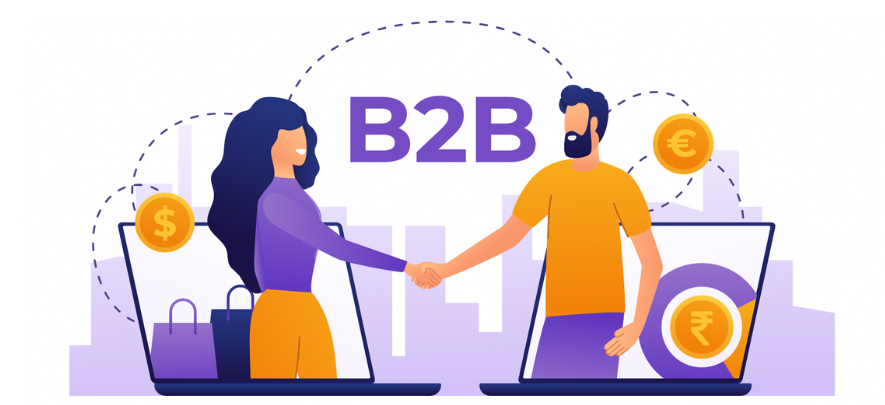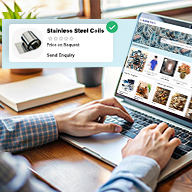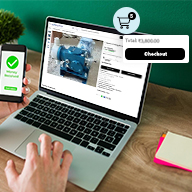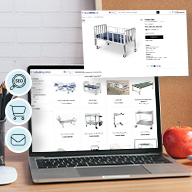5 reasons your B2B business needs an ecommerce website

Ecommerce
133 week ago — 8 min read
Businesses are trying to adapt to the ‘new normal’, while the digital medium has sped up in any and every business type and industry. The basic idea of ecommerce only being for B2C (Business to Consumer) has been fed in our minds, but today ecommerce is not only limited to B2C. Business to Business (B2B) companies have started implementing the ecommerce system too. The common goals for every business are growth and cost-effectiveness. B2B eCommerce helps businesses streamline processes, along with having satisfied customers and staff. This is a win-win for any business. The primary difference between B2B and B2C is that B2B includes bulk orders, businesses don’t buy 1-2 products, instead they tend to buy a large number of the same product.
Manufacturers and distributors are going through a dramatic shift in the way they do business. In a world where consumer expectations are at an all-time high, brands have been turning to B2B ecommerce to give their buyers the same online ordering access and lightning-fast fulfilment they are accustomed to in their consumer lives.
B2B ecommerce is a place where a number of buyers and sellers meet at a common virtual marketplace. Here, both the seller and buyer are involved in business and are not the end consumers. According to a study, B2B ecommerce growth shows no sign of slowing down. A report suggests, by 2023, the B2B ecommerce for the year 2023 can reach up to $1.8 trillion.
A typical B2B supply chain includes:
Manufacturer --> Supplier --> Distributor/Traders --> Retailer --> Customer.
The introduction of ecommerce for the B2B sector has helped businesses in reducing costs, improving data accuracy, streamlining business processes, accelerating business cycles, and enhancing customer service. Let’s understand who will benefit by creating an ecommerce platform in this chain.
Firstly, the suppliers can start an ecommerce store to sell products to the distributors; the distributor can have an ecommerce store to carry forward the chain and move the product onto the retailers, which leads to the end consumer. For instance, if a business were to buy stationery, notepads, required for their branches through one distributor, B2B ecommerce would help the distributor sell these products to the business and would make it possible for the business to conveniently bulk order online.
It's therefore right time for your business to consider upgrading to an ecommerce-enabled website to be a part of this digital transformation in B2B commerce. Here are the 5 key reasons you need to have a B2B ecommerce website.
1. Ecommerce website acts as your catalogue
Digital catalogues help to get business in real-time. Having your product catalogues online allows you to reach out to more customers, especially those who have shifted entirely to the online space. eCommerce offers an excellent search function and customers can easily find exactly what they are looking for. A digital catalogue acts as a reference for your business, and allows your existing and potential customers to view your products and services from wherever they are, as long as they have access to the internet and a mobile phone.
Also read: B2B businesses digitise their product catalogues with GlobalLinker’s eCommerce platform
2. Cost reduction
Your ecommerce website allows you to reduce costs, as you no longer have to print or distribute paper catalogues, continuing to bog down your staff with data entry. The attempt is to generate revenue that your team could be driving, if they weren’t wasting time with data entry. You count on their potential to find new customers, drive upsell and retain your current customer base. B2B ecommerce software solves this issue by syncing self-service orders directly to back office systems, such as your Enterprise Resource Planning (ERP), eliminating the need for redundant order entry processes. A B2B ecommerce also helps to ease out the burden on the sales representatives.
3. Repeat clients
With your existing clients, you may have already become their preferred supplier, you’ve earned their repeat business and can count on them to generate income. Making it easier and more seamless for them to buy from you with the ecommerce website, it will only add to your advantage. An ecommerce website helps with repeat clients, as your sales representative does not need to visit them for every order, which saves time and money for your company. With repeat customers, the opportunity to grow your businesses is to offer them a subscription service. An ecommerce platform allows repeat customers to automatically purchase and re-purchase your products and services at a much faster pace, without the extra step of getting in touch with the representative. This saves time for both you and your customers.
4. Reach out to new clients
An ecommerce store never stops – even in the middle of the night or amid festive celebrations; it acts as your ever-ready sales representative – 24x7. It serves as your best-appointed staff who doesn’t demand a holiday or overtime. With your B2B business offline, you can’t always be available. The more and more automated it gets; the better the impact on your success. The rise in B2B ecommerce allows access to more B2B buyers that can be targeted globally, anytime, anywhere. B2B ecommerce also gives access to new stores, geographies, product catalogues, divisions and so on. This makes your B2B selling more effortless than ever before. You can also make use of the power of search engines with Search Engine Optimisation (SEO) to efficiently promote your offerings to your potential clients.
5. Inventory management
A B2B eCommerce store usually comes with inbuilt inventory management capability, thereby helping you track inventory and updating it automatically with every order. Many suppliers find this feature very helpful as it leads to efficient inventory monitoring. This also eases the laborious process of manual inventory count by back office staff.
Having an ecommerce website for your B2B business can help in cutting down the paperwork to keep records, as all the orders placed on your eCommerce store will take care of that. More and more businesses are looking for ecommerce solutions to increase the ease and transparency when transacting with big companies.
Key learning from this article
Now is the time to shift your business to B2B ecommerce. Holding back could draw away the opportunity to connect to an entirely new group of buyers. Offline businesses can begin to lose their competitive advantage if they continue to rely on older methods. At the same time, new businesses and competitors could move faster with more innovative technology and ecommerce platforms. Now is time to embrace the change and dive headfirst into B2B ecommerce. So, when are you setting up your B2B ecommerce store? GlobalLinker's ecommerce solution- Linker.store allows you to create an online store easily, with one of its many features being the bulk orders capability.
GlobalLinker conducted a webinar on how to digitise your B2B product catalogue. Watch the webinar recording below.
Image source: freepik.com
Disclaimer: The views and opinions expressed in this article are those of the author and do not necessarily reflect the views, official policy or position of GlobalLinker
Posted by
GlobalLinker StaffWe are a team of experienced industry professionals committed to sharing our knowledge and skills with small & medium enterprises.
Network with SMEs mentioned in this article
View GlobalLinker 's profile
Most read this week
Trending















Comments (2)
Share this content
Please login or Register to join the discussion